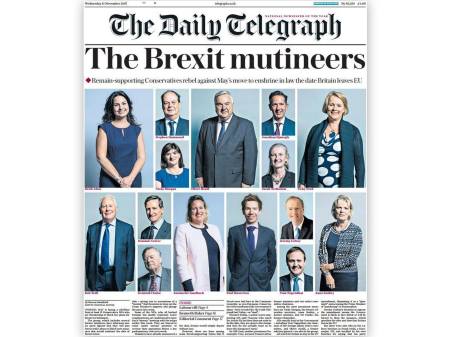By Zishi Zhang
On November 15, one of the national newspapers of the U.K., the Daily Telegraph, published the front-page headline : “The Brexit Mutineers: Remain-supporting Conservative rebel against May’s move to enshrine in law the date Britain leaves EU.”, with a photo of Members of Parliaments (MPs) below. Those pictured were in favour of the Remain side during the EU referendum debate and are now supporting a “soft” Brexit negotiation process.
The reason why they published such story is clear—as the Conservative-thinking newspaper of the country, they wanted to put pressure on these MPs and lobby them into changing their minds and positions on Brexit. After all, it is not surprising for a newspaper who openly declared their support for the “Leave” side during the EU referendum campaign to criticize politicians who are sympathetic towards the EU.
However, there is a problem. Such an emotionally charged and sensationalist article only adds fuel to the fire, making a country that is already deeply divided even more polarised. Anna Soubry, a prominent politician within the governing Conservatives told the BBC that she has received 13 death threats since the newspaper front page named her as one of 15 “Brexit mutineers.”
I am not here to target the Daily Telegraph in particular, since it is my favourite British newspaper. Nevertheless, I wanted to highlight the problem behind this event, which is the increasing polarisation and partisanship in today’s politics. The Daily Telegraph is not the only newspaper producing such articles. On the contrary, almost all media has started to bitterly attack politicians, on both political and personal terms, who have differing opinions than those of their own.
The media is sometimes referred to as the “fourth” branch of the government, providing scrutiny to ensure transparency and accountability. Within parties, different sections and the three branches of government being so polarised at the moment, I had hoped that the media could provide more neutrality and rationality, in order to balance the debate and to move the focus back to the quality of policy rather than which side of the political spectrum it is based on. This has not been the case.
One of my most memorable experiences during the Brexit Referendum campaign is witnessing how divided the country was, and to somewhat extent, still is. The “hatred” towards the other side is almost suffocating, especially to those who used to enjoy a rational debate on the nature of policies. The exchange between then Prime Minister David Cameron and then Leader of the Opposition Ed Miliband during the ‘Prime Minister’s Questions’ was witty, humorous and policy-focused. Now, the House of Commons seems to be a theater, where people no longer voice their opinions supported by evidence, but focus on shouting down the other side. The Times Newspaper reported that the Conservative MPs were allegedly told to shout Jeremy Corbyn down when he challenges the Prime Minister.
Such a development is disappointing and upsetting. When all three branches became polarised, the media did not only fail to reverse this unhealthy process, but they also deteriorated the situation further by deliberately publishing articles with little content and many divisions. A series of new types of media is emerging, based on non-traditional platforms such as Twitter. An example is a Left Wing blog that emerged in support of Corbyn, which frequently attacks centrist and Conservative politicians. With all sorts of information pouring in from all different sources, we live in an age with too much information and too little time to think about questions such as: who the author is, why they wrote the article, how truthful the content is and so on.
We are too quickly attracted by headlines, and it is not long until we are made to feel the anger of the author. With polarisation seeming to rise to a new height, such as that a newly elected Labour MP declared in her maiden speech, that she would not hang out with Conservative colleagues as they are the “enemy.” I too seem to become disillusioned with policies right now. It is upsetting especially to those who love it the most.
Zishi Zhang is a first year student, born and grew up in China, and moved to the UK six years ago. Zishi received the prestigious Diana Award and was exclusively interviewed by the New York Times for his activism. Zishi’s column runs the fourth Tuesday of every month.
Image: The Daily Telegraph: ‘The Brexit Mutineers’
Other posts that may interest you:
- The Trouble with ‘Ecocide’
- Carbon dioxide removal – hit or miss?
- Local Victories for Turkish Opposition — A Sign of Hope?
- Are France and Japan a Mismatch Made in Heaven?
- A Reflection on Dark Tourism
Discover more from The Sundial Press
Subscribe to get the latest posts sent to your email.






Join the discussion One Comment